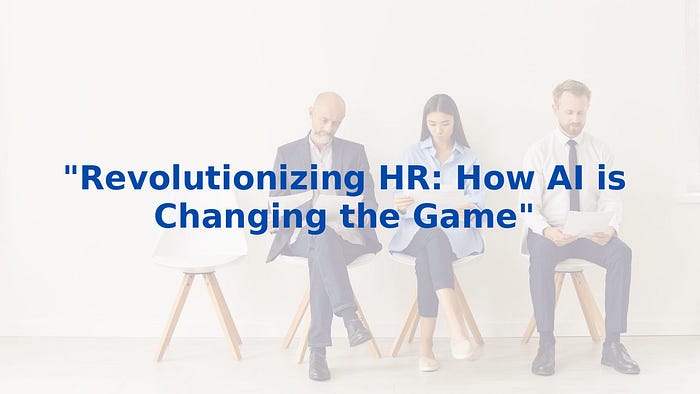“Revolutionizing HR: How AI is Changing the Game”
Imagine driving through a bustling metro or managing a corporate office. Now, picture these environments evolving under the meticulous guidance of advanced data analytics and cognitive technologies, orchestrated seamlessly by AI (Artificial Intelligence) solutions. Today, human resources (HR) and AI form a compelling partnership, revolutionizing work practices and ensuring more inclusive, diverse, and fairer workspaces.
“Changing algorithms is easier than changing people” — Sendhil Mullainathan, professor of behavioral and computational science at the University of Chicago
The Potential of AI in Human Resources
The rise of AI brings forth a paradigm shift in handling routine HR tasks. AI’s ability to process vast amounts of data and identify patterns helps to eliminate biases intrinsic to human decision-making. By focusing on criteria devoid of personal prejudices, AI enables organizations to foster a diverse and inclusive environment.
For instance, algorithms can analyze application data to select candidates based on objective metrics, not subjective judgments. This not only enhances the recruitment process but ensures that merit takes precedence over inadvertent biases. Studies note that these systems are increasingly accurate, overcoming the limitations of human-only judgment.
Why AI in HR is a Game Changer
The traditional hiring processes hinge heavily on subjective assessments, susceptible to biases, which can distort fair evaluations. AI addresses these limitations by consistently applying unbiased criteria across the board. This objective decision-making ensures that recruitment, appraisals, and promotions are fairer.
A study by The New York Times reveals that AI can help identify and mitigate biases in hiring, pushing the industry towards more equitable practices. In light of this, many forward-thinking organizations are leveraging AI not just for efficiency but to uphold ethical standards.
“The nudge doesn’t focus on changing minds. It focuses on the system.” — Iris Bohnet, Harvard Kennedy School professor
This shift isn’t merely theoretical. Companies like ZENJOB, a German startup, are already exemplifying these principles. With a €27 million investment, ZENJOB is scaling its AI capabilities to provide a digital staffing service that matches job seekers with employers. By continuing to refine their algorithms, ZENJOB ensures equitable hiring practices are adhered to, setting a precedent in the HR sector.
The Future of AI in Human Resources
Despite AI’s revolutionary capabilities, some reservations remain about its impact on human-driven processes. There’s an ongoing debate on balancing algorithmic decisions with human intuition. However, as AI technologies mature, they’ll play an increasingly supportive role in strategic HR decisions, helping managers make data-backed choices.
In this evolving landscape, educational initiatives are paramount. They’re essential to equip HR professionals with skills to work alongside AI, ensuring they understand these systems’ potentials and limitations. By integrating AI literacy into HR training programs, companies can better harness these technologies’ benefits while mitigating risks.
Embracing AI: A Crucial Step Forward
For organizations to stay competitive, embracing AI in HR isn’t optional — it’s imperative. Those who adapt quickly to these technological advancements will lead their industries, streamline operations, and create an inclusive workplace culture. In contrast, laggards may find themselves besieged by inefficiencies and biases inherent in outdated practices.
Equally crucial is fostering a culture that accepts and integrates AI solutions. Change management practices, such as transparent communication and continuous feedback loops, can ease this transition. By demystifying AI and demonstrating its tangible benefits, organizations can facilitate a smoother integration.
Conclusion
As we navigate the future, it’s becoming abundantly clear that the collaboration between human resources and AI holds immense potential. This partnership promises not only to optimize efficiency but to push the boundaries of fairness and inclusion in the workplace. With companies like ZENJOB leading by example, the trajectory for AI in HR is poised for significant positive impact. By embracing these advancements, organizations can unlock new levels of innovation and progress in their HR practices.
References:
Amador, C. Future of Work: 5 ways technology is reshaping work and the workplace. Retrieved from: https://allwork.space/2020/01/future-of-work-5-ways-technology-is-reshaping-work-and-the-workplace/
Maguire, J. The Artificial Intelligence Index. Retrieved from https://www.datamation.com/artificial-intelligence/the-artificial-intelligence-index.html?utm_source=quinstreet&utm_medium=display&utm_campaign=housebanners01232020
Check out: Complete AI Training



